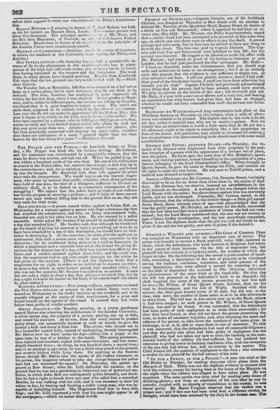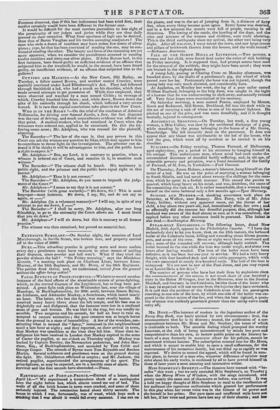GRANGE V. WIGNEY AND ormats.—The Court of Common Pleas was
occupied on Wednesday with an important case of trover. The action was brought to recover a Bank post-bill, value 1001., indorsed in blank, which the defendants, who were bankers at Brighton, had taken in the course of their business. On the 10th of September last, the plaintiff left her reticule in a hackney-coach, the number of which she forgot to take. On the following day she caused a great number of handbills, containing a description of the loss of property to be circulated among the hackney coachmen, watermen, and other persons of the same description, who were offered a reward for restoring it ; and on the 24th of September she inserted in The Morning Advertiser an advertisement of the same kind as the hand-bills. On that day the bill was presented at the defendant's bank to be changed; the clerk inquired the name of the person presenting it, and was told he was a Mr. Wilson, of Great Queen Street, London, then on his road to Southampton and the Isle of Wight. Satisfied with this answer, the clerk gave twenty notes of Si. each, but did not, at the time, take down the number of these notes so as to be able afterwards to trace them. The bill was in due course sent up to the Bank, where it had been stopped ; no such person as Mr. Wilson, of Great Queen Street, was now to be found. It was contended, that the defendants had been guilty of such negligence as to make them answerable ; for that they were bound, as they did not know the person presenting the note, to make all necessary inquiries, and, after obtaining the name and address of the person, to take down the numbers of the notes given in exchange, so as to be able to trace them in case of necessity. To this it was answered, that the defendants had used all reasonable diligence ; and that the party who alone had been guilty of negligence was the plaintiff, who had not taken any care to warn the banking or the commercial world of the robbery she had suffered, but had confined her attention to giving notice to hackney coachmen. who, with the exception of the one that had driven her, had no interest in the matter. The Chief Justice left the question of negligence to the Jury ; who returned. a verdict for the plaintiff for the full amount of the note.
"PM FOR A PENNY, IN FOR A POUND."—A man was tried at the Old Bailey on Tuesday, for stealing sixty-one silver plates from the Marquis of Bath. There was not the slightest evidence to connect hint with the robbery, except his having been at the house of the Marquis on the night when the robbery was alleged to have taken place. He was acquitted. The same person was then tried for stealing some dozen of drinking-glasses; and from an admission of his own after he was in custody, coupled with an identity of resemblance in the crystal, he was found guilty. Mr. Baron Vaughan observed that the verdict was a pioper one; and if this case had been tried first, a different verdict, he thought, would have been returned by the Jury in the former case. The
Foreman observed, that if this last indictment had been tried first, their verdict certainly would have been different in the former case.
It would be difficult for the most careless journalists to lose sight of the perspicacity of our judges and juries while they are thus daily pressed on their attention. What finer specimen of logic can be desired, than that of Baron Vaughan and his twelve assenting coadjutors! The man who stole a dozen of tumblers may have stolen five dozen of silver plates; ergo, he that has been convicted of stealing the one, may be convicted of stealing the other. The beauty and force of the reasoning are yet more apparent, when we consider the punishment annexed to stealing twelve tumblers and sixty-one silver plates. If John Barnes had, in the ,first instance, been found guilty on sufficient evidence of an offence that subjected him to the treadmill, he would, in the second, have been found _guilty, on insufficient evidence, of an offence that subjected him to the gallows!
CUTTING AND MAIMING.—At the New Court, Old Bailey, on Tuesday, a fellow named Brown, and another named Crawley, were -capitally convicted under Lord Ellenborough's Act. They had followed through Smithfield a lad, who had a trunk on his shoulder, which they -made several attempts to get possession of. While thus employed, they were observed and watched by a man named Childs ; in revenge of 'which, Crawley knocked him down ; and, while down, Brown drove the pike of his umbrella through his cheek, which inflicted a very severe wound. It is rare that capital convictions take place in the New Court.
Wno is IN THE RIGHT ?—On the trial of the coachman of Admiral "Tollemache, for driving over Samuel Jacobs, a Jew, the fact disputed was the rate of driving, and much contradictory evidence was offered on that point. A medical student, who had remained in Court when the 'witnesses were ordered out, applied to be examined. On this the following scene arose; Mr. Adolphus, who was counsel for the plaintiff, objecting. The Recorder—" The law of the case is, that any person in this Court can ask the witness any question he likes,which may appear to him to contribute to throw light on the investigation. The prisoner can den-maid it if he thinks it will be advantageous to him, and the public have a right to expect it."
Mr. Adolphus—" But, my Lord, it is contrary to practice, when a witness is ordered out of Court, and remains in it, to examine such witness."
The Recorder---" The witness shall be heard. His testimony is public right, and the prisoner and the public have equal right in this matter."
Mr. Adolphus—" Then it is not correct." The Recorder—" Mr. Adolphus, do you mean to impeach the judgment of the Court ?"
Mr. Adolphus—" I mean to say that it is not correct." The Recorder (with great warmth)—" Sit down, Sir ! This is most Improper—most indecent. Sit down, I say, Sir, and do not say so again, or Mr. Adolphus (in a vehement manner)—" Twill say, in spite of any attempt to put me down, I —" The Recorder—" I shall be sorry, Mr. Adolphns, after our long friendship, to go to the extremity the Court allows me. I must insist that you sit down."
Mr. Adolphus--" Twill sit down, but this is contrary to all former practice." The witness was then examined, but proved no material fact.



























 Previous page
Previous page